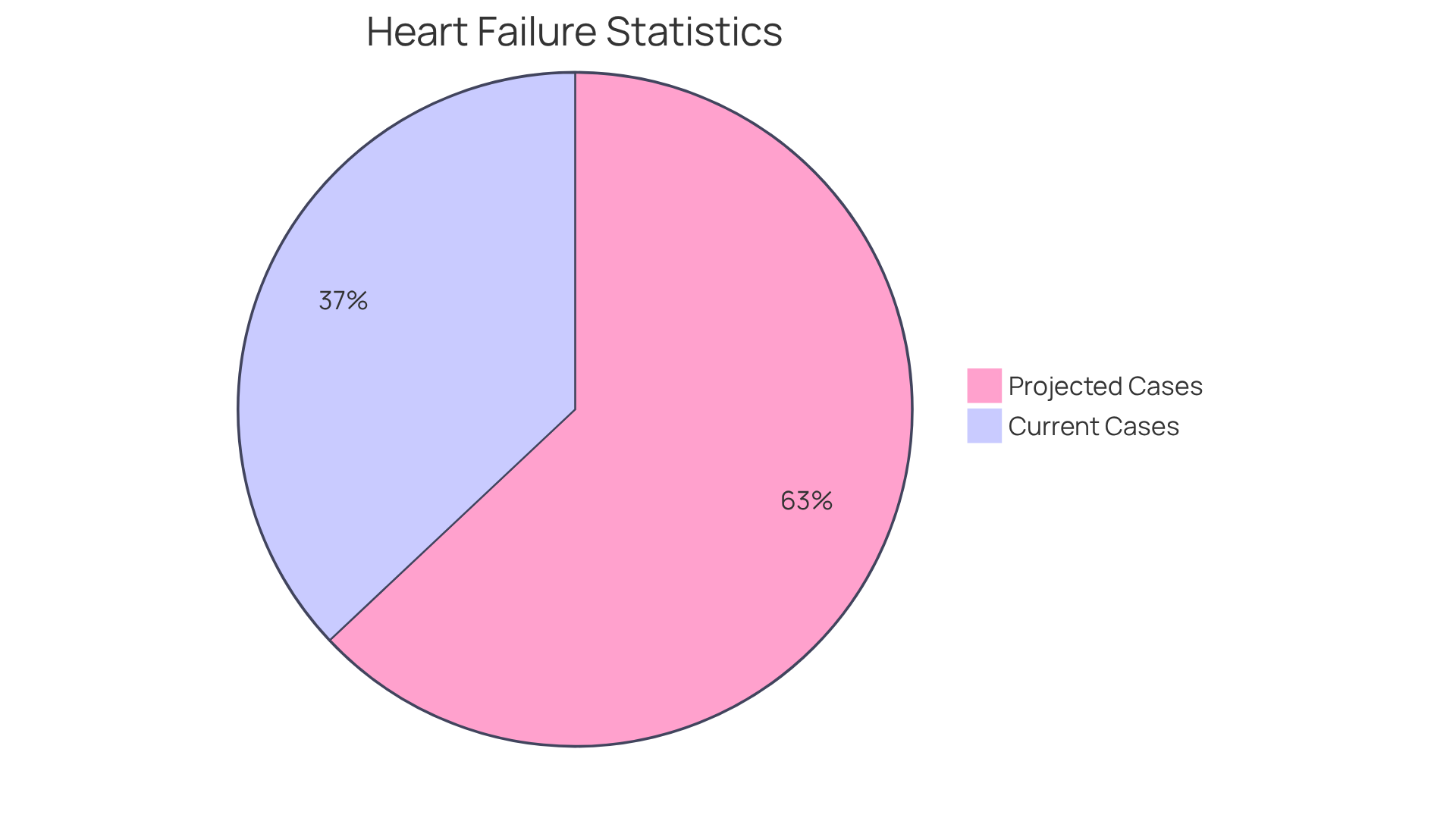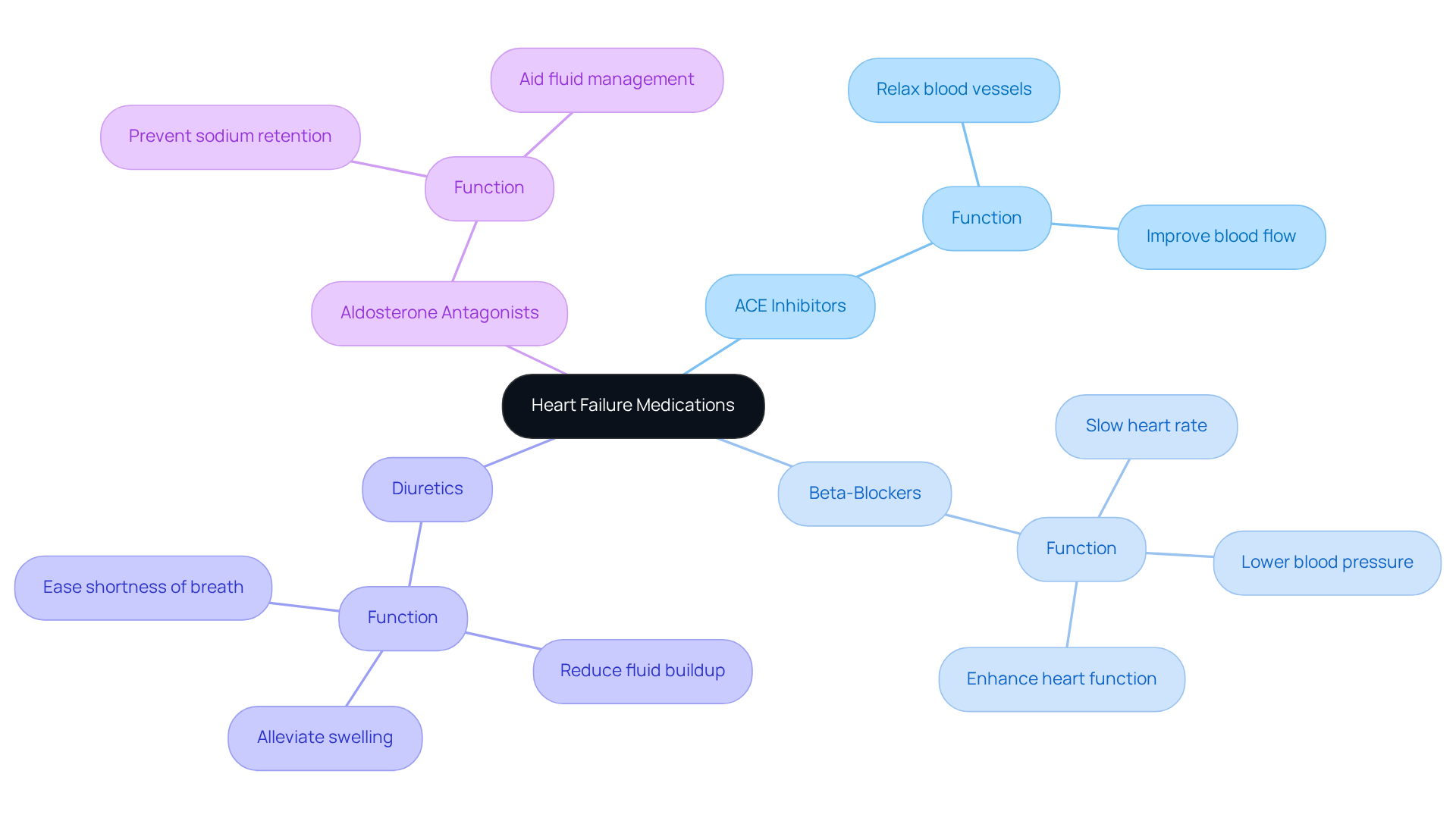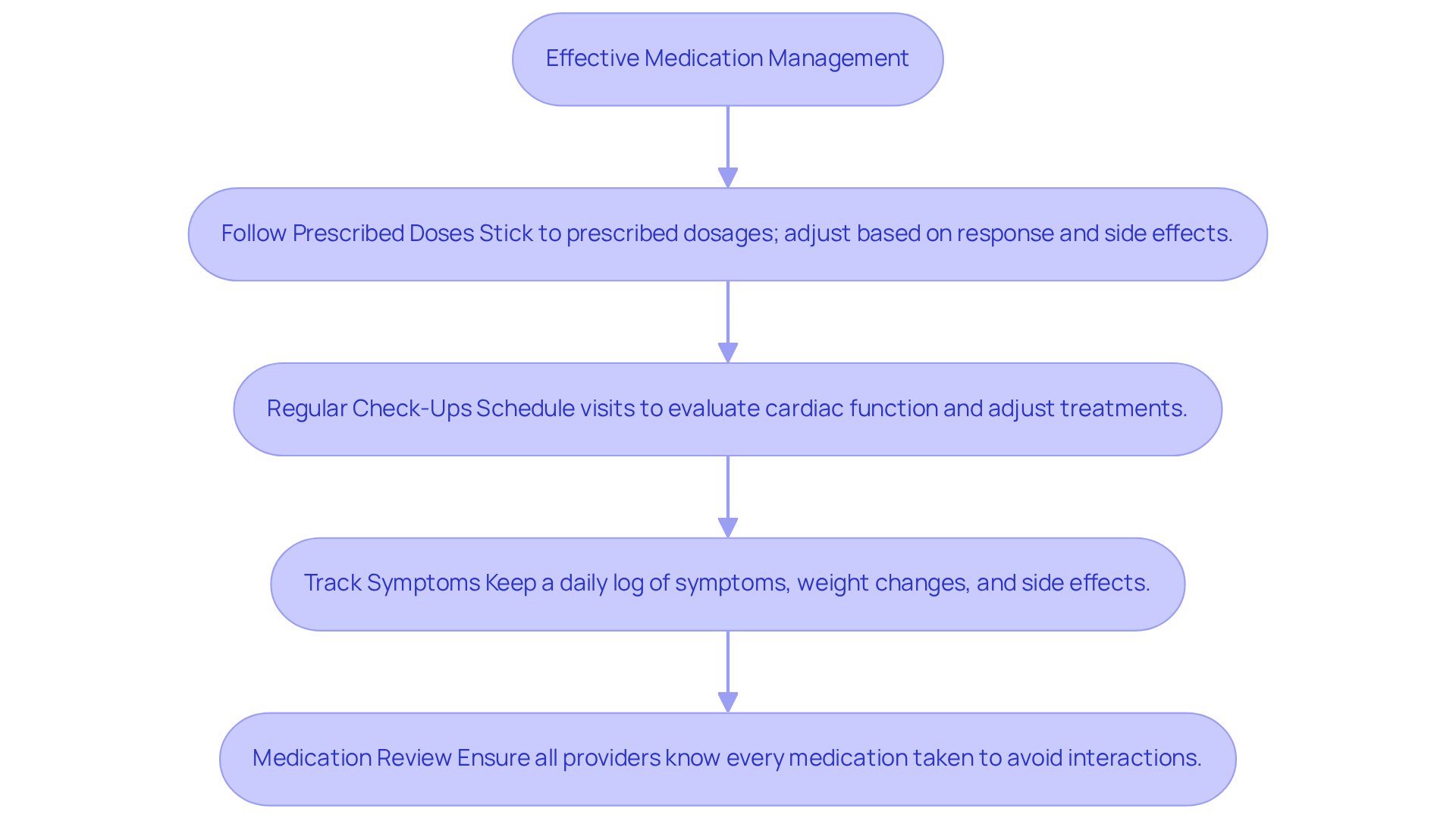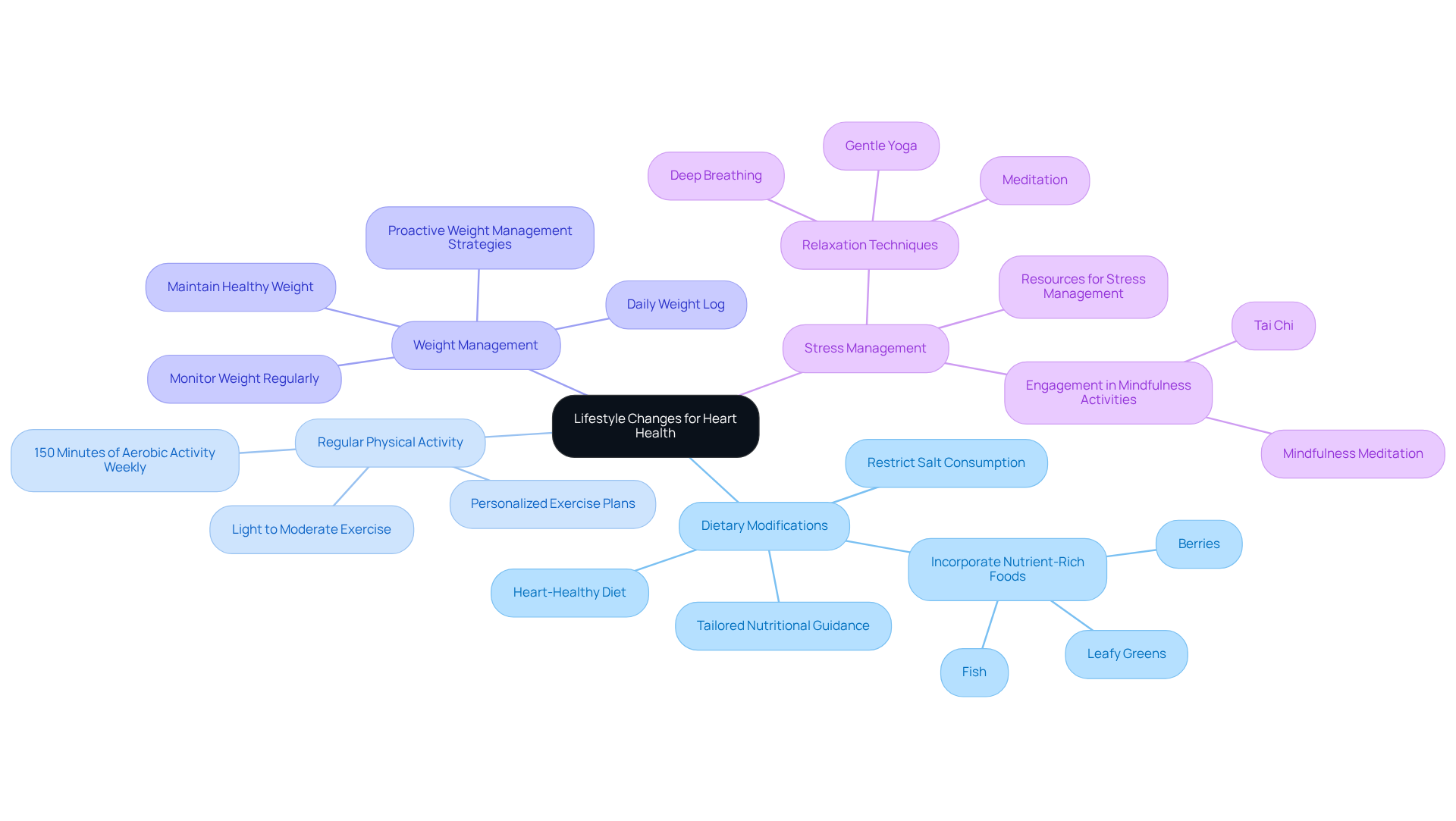


For elderly patients facing heart failure, essential medications such as ACE inhibitors, beta-blockers, diuretics, and aldosterone antagonists play a crucial role in managing symptoms and enhancing heart function. It's important to understand how these medications work, as this knowledge can empower you to stick to your treatment plan. By doing so, you can improve your quality of life and overall health outcomes.
In addition to this, recognizing the impact of these medications can alleviate some of the concerns you may have about your health. Remember, you are not alone in this journey. Many patients find comfort in learning about their treatment options and the positive changes they can bring. If you have questions or need support, please reach out. Your health and well-being are our top priorities, and we are here to help you every step of the way.
Understanding heart failure is crucial, especially as it increasingly affects our elderly population. Millions are currently living with this condition, and projections indicate a worrying rise in cases. Heart failure not only compromises physical health but also diminishes quality of life, making effective management essential.
In this article, we will explore the vital medications available for heart failure, their mechanisms, and the importance of proper medication management.
How can elderly patients navigate this complex landscape of treatments while also integrating lifestyle changes to enhance their heart health? Together, we can find the answers that support your journey towards better heart health.
Cardiac insufficiency is a long-term condition that affects the heart's ability to circulate blood effectively, leading to inadequate blood flow to meet the body's needs. For many elderly patients, this condition may stem from age-related changes in heart structure, previous heart attacks, or chronic illnesses like hypertension. The impact of cardiac dysfunction can be profound, influencing not just physical health but also emotional well-being and overall quality of life. Common symptoms, such as shortness of breath, fatigue, and fluid retention, can hinder daily activities and reduce independence.
Have you or someone you care about experienced these challenges? Research shows that around 6.7 million Americans over the age of 20 are currently living with heart failure, with projections suggesting this number could rise to 11.4 million by 2050. Additionally, studies indicate that older individuals often face a reduced quality of life, with nearly 50% experiencing a five-year mortality rate. Understanding these challenges is vital for both patients and caregivers, as it empowers them to and seek timely medical assistance.
Addressing cardiovascular issues and their impact on daily living is essential for improving health outcomes and enhancing the quality of life for older adults. Remember, you are not alone in this journey; support is available, and taking the first step towards care can lead to a brighter tomorrow.

Managing heart failure can feel overwhelming, but understanding the meds for heart failure available can provide you with hope and clarity. There are several categories of treatments, such as meds for heart failure, each playing a vital role in your care. Let’s explore some common options:
Understanding how these meds for heart failure work can empower you to follow your and communicate effectively with your healthcare providers. If you have any concerns or experience side effects, remember that you are not alone—reaching out for support is a positive step towards managing your health.

Overseeing treatments for cardiac failure involves a careful focus on dosing and consistent observation of the meds for heart failure. This is especially important considering how valve disease can impact symptoms like breathlessness and fatigue. Here are some key strategies to support your journey towards better health:
Additionally, Amavita offers minimally invasive therapies that can significantly improve symptoms related to valve disease, enhancing your overall cardiac function and quality of life. By embracing these strategies, you can boost your treatment compliance and effectively manage your cardiac issues, while also addressing the symptoms associated with valve disease. Remember, you are not alone on this journey; support is always available to help you navigate your health challenges.

In addition to the meds for heart failure, several lifestyle changes can significantly enhance heart health for elderly patients with heart failure, especially when supported by comprehensive programs like Amavita's CardioElite™.
Incorporating these lifestyle modifications empowers patients to actively engage in their cardiovascular health, enhancing their medication plan which includes meds for heart failure and greatly boosting their quality of life. Cardiologists emphasize that even small adjustments in diet and exercise can lead to substantial benefits for older adults, reinforcing the importance of a holistic approach to heart failure management, particularly through the support of innovative programs like Amavita's CardioElite™.

Understanding heart failure and its management is crucial for elderly patients, as it significantly affects their quality of life and overall health. This article highlights the importance of recognizing heart failure as a serious condition that requires a comprehensive approach, including medication management, lifestyle changes, and regular healthcare consultations. By grasping the complexities of heart failure, patients and caregivers can better navigate their treatment options and improve health outcomes.
Key points discussed include the various classes of heart failure medications, such as:
Each playing a vital role in managing symptoms and enhancing heart function. The article also emphasizes the necessity of effective medication management strategies, including:
Furthermore, integrating lifestyle changes—such as dietary modifications, physical activity, weight management, and stress reduction—can significantly bolster heart health and complement pharmacologic interventions.
Ultimately, embracing a holistic approach to heart failure management is essential for elderly patients. This involves not only adhering to prescribed medications but also making informed lifestyle choices that can lead to improved well-being. By taking proactive steps and seeking support, individuals can enhance their quality of life and navigate the challenges of heart failure with greater confidence. The journey towards better heart health is a collaborative effort, and every small change can lead to substantial improvements in health outcomes.
What is heart failure?
Heart failure, also known as cardiac insufficiency, is a long-term condition that affects the heart's ability to circulate blood effectively, leading to inadequate blood flow to meet the body's needs.
What causes heart failure in elderly patients?
In elderly patients, heart failure may stem from age-related changes in heart structure, previous heart attacks, or chronic illnesses such as hypertension.
What are the common symptoms of heart failure?
Common symptoms of heart failure include shortness of breath, fatigue, and fluid retention, which can hinder daily activities and reduce independence.
How many Americans are affected by heart failure?
Approximately 6.7 million Americans over the age of 20 are currently living with heart failure, with projections suggesting this number could rise to 11.4 million by 2050.
What is the impact of heart failure on quality of life?
Older individuals with heart failure often face a reduced quality of life, with nearly 50% experiencing a five-year mortality rate, highlighting the profound impact of cardiac dysfunction on physical health and emotional well-being.
Why is it important to understand heart failure?
Understanding heart failure is vital for both patients and caregivers, as it empowers them to manage the condition more effectively and seek timely medical assistance.
How can addressing cardiovascular issues improve health outcomes?
Addressing cardiovascular issues and their impact on daily living is essential for improving health outcomes and enhancing the quality of life for older adults.